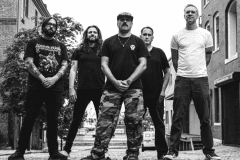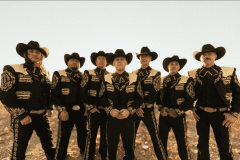It can be difficult for a fledgling band to attract listeners based solely on musical merit and, while it’s not uncommon to mention members’ previous endeavors, Highness’ debut album Hold stems from a desire to create something more than the sum of its parts, something hinted at by the contributing artists’ past work but expected by nobody.
The band’s pedigree includes such varied approaches as Christie Front Drive, Darket Hour, Antarctica, and City of Caterpillar to name a few. But Highness is less about what its contributing musicians have done and more about the process of reinvention and refinement to which they have spent decades dedicating themselves.
Ghettoblaster caught up with guitarists Graham Scala, Brent Eyestone and Eric Richter to chat about their previous work, as well as their breathtaking debut LP Hold, which drops via Eyestone’s Magic Bullet Records on May 14. This is what they said…
Under what circumstance was the band assembled and what made this project attractive for you?
It’s been a gradual process over the past year or two attempting to settle on a stable lineup and subsequently to determine what direction that group of members would take the music. We all converged upon the band from different backgrounds and possessing different motivations, but that’s what keeps it interesting. I won’t speak for anybody else regarding motivation, but I’ve listened to a lot of records that the other members of Highness have either played on or released for a very long time, so to be able to be a part of their respective creative continuums is exhilarating and surreal. (Graham Scala)
Magic Bullet seems like an appropriate home for Highness considering their long-running role in the emo, punk and hardcore lexicon and Brent’s ownership there. Did you ever flirt with another label for Hold?
I don’t think there would’ve been much benefit from trying to find another label. With the album coming out on Magic Bullet, we’re able to keep all the creative facets in-house. We can be better assured that there won’t be any decisions with which we won’t agree and that, because the person releasing it is the person playing guitar on it, it’ll be treated respectfully and pushed out into the world accordingly. (GS)
Initially, there was period upon the completion of the album where I talked to several labels about being involved. The guys didn’t request that of me and it’s something I took on myself. Part of it was to see if there were any labels out there releasing music in ways we hadn’t thought of and might benefit from as a band. The other part was a bit more selfish in wanting to see where Magic Bullet’s terms fall amidst the current landscape of artists and labels. What I found was that nobody could match the terms that MB extends our bands, which only served to reaffirm to me that it’s still one of the most artist-centric options around. Besides, if it’s good enough for active bands like This Will Destroy You, Integrity, and archival representation for Christie Front Drive, it’s certainly good enough for five guys that have done dozens of records in other bands on the label prior.
From a band member perspective, Graham nails it when he mentions the importance to Highness in having all of our creative processes and needs manageable in-house. I’ve been fortunate to have the best advice-giver and music industry case-study possible at my disposal for the last 19 years in the form of Ian MacKaye living just up the road. Even before I started the label and was just booking shows, he made himself available for all guidance and direction I could possibly need. He has kept the door/phone/email/post open ever since and I’ve utilized that resource at every crossroad along my own path. In all that time, I’ve learned a lot from his words and his actions. It’s a big reason why we do things how we do them over here, both band and label-wise. (Brent Eyestone)
How intentional was it to find ways to meld respective styles into something that acknowledges your artistic pasts while forging a path ahead?
We’ve all been integrated into the band based on certain strengths that lend themselves to what we do, so to a certain extent it’s intentional but I don’t know that, once we’re all in a room together writing, any melding of styles can be chalked up to a conscious decision. We just do it and hope for the best. (GS)
Is there a theme that ties Hold together? What were the catalysts for this output?
I’ve never really looked at what we’re doing in terms of specific themes. I guess if there’s one unifying force between the five of us, it’s an extraordinarily deep passion and love for music that extends far beyond how a typical human relates to music in their daily life. We’re still the guys who love it so much that we read all the liner notes of every album we buy and spend all our non-practice hours with each other sharing music on our iPods, talking about recordings, and even emailing each other links to stuff the other guys may not have heard yet. We consume as much interesting sound as possible and I think it helps us know how to speak to each other when creating, even if it’s without words sometimes. (BE)
Who was involved in the production of the record and what did they bring to the table?
Andrew Schneider is ultimately the one individual that came aboard and helped us understand who we are and what we were creating. It’s a heady task bringing in three guitars, three vocalists, and five unique, veteran musicians and then steering them toward the realization of their first record together. There were a lot of challenges involved with reigning in what we brought to Andrew, but his pedigree and experience allowed for some major breakthrough moments that might not have been possible with another engineer/producer at the helm. For instance, I walked in having only played Les Paul guitars for the last couple decades, but walked out having completely adopted baritone guitars for all the Highness material. It’s opened up a whole new realm of sound and possibility toward my writing, so I’ll forever be indebted to him for stopping and actually thinking through the best possible solutions for all the sonic textures we proposed to him (the baritone switch being but one example).
Outside of technical matters, Andrew was also able to hear the songs and mix them from an emotional perspective. While I prefer to leave the band name open to interpretation, it’s important to me that the people who find kinship toward our music indeed feel a lift upward upon returning to the albums… perhaps a bit of a silver lining amidst whatever’s going on in their immediate lives. I’m not interested in hearing about our technical prowess from other people. I’m interested in hearing how the music fit in with each individual’s bigger picture and how they processed it for themselves.
On the mastering end, we went with Emily Lazar and Joe LaPorta over at The Lodge for the same reasons. When you listen to the jobs they did for Björk, Foo Fighters, Minus the Bear, et al., you’re hearing the work of people who invest themselves in music as more than just “a job” and who are able to immerse themselves in the realization of each band’s goals and aspirations. Before we even cracked open the stems and got to work on the mastering, there was an extraordinary amount of back and forth pertaining to conceptual, technical, and emotional jumping off points. They are all music nerds like us over there, so it was very easy to communicate in the same language and come away with the intended results. (BE)
Have any of you ever flirted with hanging it up after almost two decades as musicians?
Every time rent’s due. (GS)
I don’t recall ever having that inner monologue, but I will say that staying on top of the business aspects of music coming out of my corner of the universe often squeezes in on the time that I should be spending learning more about playing music. I think that’s why I’ve always sought to play with people that are better than me: it helps me rise to the occasion and hopefully go past where I was the day before. As long as there’s progression and happiness, I’ll always stay involved with playing music. (BE)
Personally, I could never stop playing music. It’s probably the only thing that keeps me functional. (Eric Richter)
Is it easier to do this in 2013 than it was in the ‘90s?
It’s just a different beast now. I’m not going to romanticize that era and I’m not going to hail or crap on this era. Personally, I’m just as motivated to play music now as I was then. If anything, I simply appreciate it more now because I’m old enough to realize how precious and special it is to be able to go into a room with four like-minded friends and come out with a bunch of new, exciting sounds that make you feel like you’re living your life versus observing it or maintaining it or whatever trappings a lot of fellow 30-somethings fall into when they “get serious” about mortgages or “the future” or what have you. I have those pressures too… and they’re precisely why I get more out of making music at 36 than I did when I was 18. (BE)
I couldn’t find any tour dates for the band online. Does Highness have plans to tour in support of the record or is this more of a studio project?
We have a decent sized geographical spread between the five of us, so getting together to play live isn’t the easiest proposition. That said, we’ll definitely be gracing a stage somewhere at some point. (GS)
It’s a band. It’s a priority amongst all five of us. But it’s also only the first record and we realize that, in a saturated sea of new music, the record should be heard and circulated a bit in order to figure out where to take it in a live capacity. (BE)
Do you think younger audiences in the current indie landscape will see the significance of this group of people making music together? Do they even have to be familiar with the past bands for it to make sense?
God I hope they do. But I don’t think a familiarity with our older bands is necessary. If anything, it might confuse the issue even more because anybody expecting a linear continuation of Christie Front Drive or Darkest Hour isn’t really going to get that. (GS)
Younger audiences are probably smarter than we were when we were that age because they’ve literally got the history of music just sitting there in their purse or pocket. If they stumbled into any of our bands prior and found a fondness, I’d certainly hope they’d jump on and check out what we’re all doing now. At the same time, I don’t think any awareness of the players involved matters ultimately. A good movie is a good movie regardless of what the director did before. A good record just makes you happy you have it. (BE)
What are your feelings on the reunion runs we’ve seen in recent years (TITR, Refused, At The Drive-In, Braid, etc.)?
Negative Approach killed it when I saw them a few years back. That’s about all I feel qualified to comment on in that regard. (GS)
I’ve been too busy writing new music and playing with these guys to reflect much on what other people are doing with their old bands in modern times. In general, reunions are uninteresting to me in my life (I even skip all my high school and college reunions) and I remember saying some years back that the only band I wanted to see back were the Afghan Whigs. They left such a great impression on me in the ‘90s, they ruled live, and I knew they’d age gracefully. Well, they did a run last summer and Eric and I went to multiple shows. They were lovely. (BE)
Is there a possibility for a future CFD, CoC, Antarctica, etc. reunion?
I think CFD will always play sporadically, for better or worse, until one of us dies. As for Antarctica, I think there’s a better chance of O.J. Simpson finding whoever killed Nicole and that waiter than us playing together again. I love them all dearly, but it’s not going to happen. I can’t speak for CoC. (ER)








Social Media